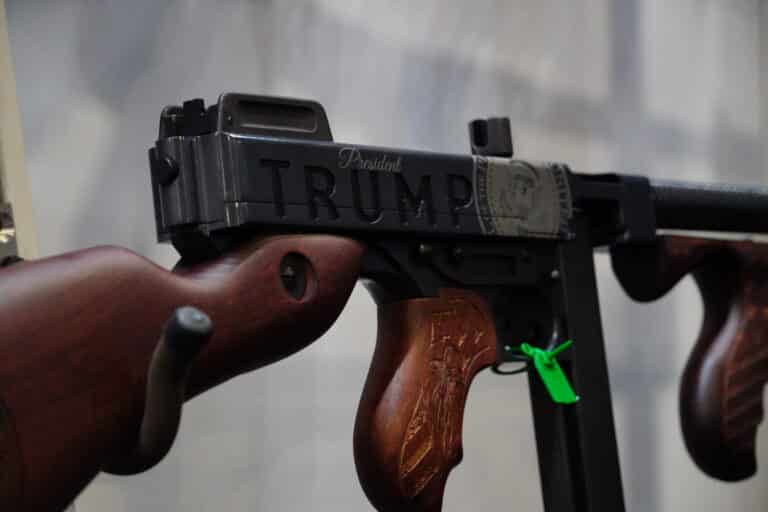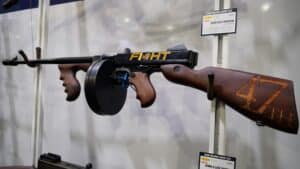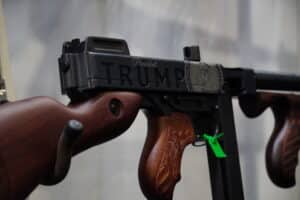In 2006, Congress made the ATF Director a Senate-confirmed position, and it’s been getting in the way of the president’s preferred picks ever since.
On Thursday, the ATF said Director Steven Dettelbach submitted his resignation letter to President Joe Biden. He will be out of the role precisely two days before Trump retakes the office. That gives Donald Trump another shot at appointing a permanent director of his own.
However, since it became a confirmed position, the ATF has had far more failed director nominees than confirmed ones. Can Trump overcome those odds? Will he even try?
In 2007, President George W. Bush put up the first nominee for Senate consideration. His name was Mike Sullivan, and he was already the acting director, a former Republican state representative and US Attorney. Three Republican Senators held up his nomination over concerns about how he’d enforce federal gun laws, and it never actually got a vote.
In 2009, Sullivan resigned as acting director in order to make way for President Barack Obama to appoint his own pick. That pick was Andrew L. Traver, head of the ATF’s Colorado field office at the time, and he was blocked in much the same way as Sullivan despite Democratic control of the Senate.
In 2013, Obama tried again with B. Todd Jones–another US Attorney and acting director of the ATF. This time, Obama was successful. Jones was confirmed.
However, he didn’t last long. Jones resigned in 2015 to pursue a job with the NFL.
Donald Trump was the next president to try to appoint a permanent director. He nominated Chuck Canterbury, who was President of the National Fraternal Order of Police, to fill the role in 2019. However, that candidate was once again blocked by Republicans concerned about his leanings on gun policy. He never got to vote, either.
Joe Biden took his first shot at filling the role in 2021. He picked former ATF agent turned gun-rights activist David Chipman. His nomination was sunk by Democratic Senators over a series of controversial statements backing new gun bans and reporting on accusations he’d made racist remarks while working at the ATF. Biden withdrew his nomination.
However, Biden went back to the ATF well in 2022. This time, he nominated former US Attorney and failed Ohio Attorney General candidate Steven Dettelbach. Biden picked Dettelbach as a more muted candidate, but his record of backing new gun restrictions, coupled with the polarizing nature of the confirmation process, made his confirmation a nailbiter as well.
Still, the Senate voted to confirm Dettelbach in the summer of 2022. So, it is possible to get a candidate through. It just isn’t easy and takes a lot of skill at working at least your own party as well as spending considerable political capital.
There are some reasons to think Trump could pull it off this time around. For one, he now has some experience on this front and can avoid nominating a candidate with the same issues that plagued Canterbury. He is also riding high from the best electoral performance of his career, with greater control over his own party than ever before.
Republican Senators, who will ultimately control the destiny of any Trump ATF nominee, will need good reasons to oppose anyone he puts up.
However, it’s not clear Trump is very interested in getting a permanent ATF Director confirmed. While he promised to fire Dettelbach and roll back Biden’s ATF rules during the campaign, he never promised to nominate a permanent replacement. Nor has he announced a nominee so far.
Most of the nominees he’s announced for other key law enforcement roles haven’t been met with cheers from gun-rights advocates, either. Pam Bondi, whom he picked for Attorney General, has a mixed record on guns—not dissimilar to Trump’s own record. Chad Chronister, whom he picked to head the DEA before quickly reneging, is in the same boat.
Trump was also happy to use acting directors throughout his first term, at the ATF and throughout the executive branch. He may simply opt not to get into a big political fight, likely with his own supporters, in order to get a permanent director through the often brutal Senate confirmation process. The ATF is not an agency he has spent much time talking about in public, and he may not be willing to push for a nominee if he doesn’t have to do so.
Still, even if he does decide to take another run at installing a permanent director, history shows he’ll have to navigate a difficult path to get to that endpoint.






